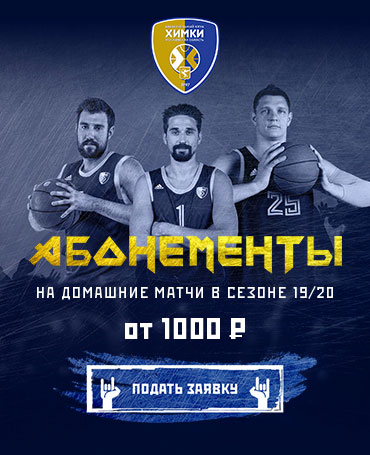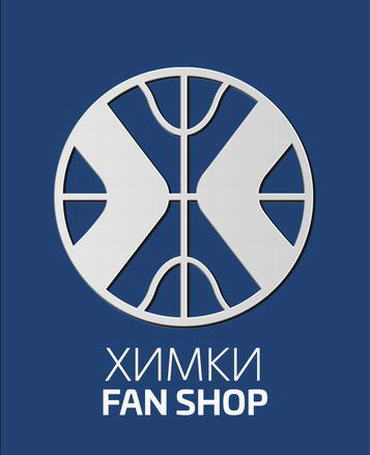Element of surprise and psychological pressure11 february 2007
There is not doubt BC Khimki has made its own way. However, faced with the game against the champion, there was apprehension that they would not have enough of the “element of surprise” in them. It's possible that Dynamo would not have been prepared, some days prior to the game Khimki played. CSKAs coaches had the chance to analyze their opponent’s game. In Europe, it's difficult to find such an experienced opponent, nonetheless…
At the end of the game against CSKA, the lucky coach for BC Khimki, Kestutis KEMZURA, recognized that after the victory he was exhausted for any emotions or effort.
— We knew the match against the European champion was not going to be easy. After the Dynamo game we made some adjustments, even in the warm up, which allowed us to start off well, faster, and more loosely. The boys were able to take advantage when presented with the chances.
— The task was the following: to be in the game, don’t let the opponent go to the rematch. It's not every day we get the chance to play such a strong team. CSKA is the favorite in all games, which put them under more psychological pressure than us. Our team is strong, the aim is to play and have a good time of basketball, for the fans, who I want to thank for their mighty support.
— We were able to “hold down” the opponent, but I can't say I didn’t have some expectations, for the team, and for myself. We didn’t play an ideal defense, not being able to get a hold on Langdon. The situation was made more difficult by the fact that Veremeenko got two fouls. We had to make some adjustments during the course of the game. I am very happy that Diatchok was able to play with so successfully. We were expecting CSKAs pressure on our guards would be bolstered in the second half. We started to skid a bit on the offense, and for some minutes we lost some order, but we held out, and in the key moments we did not let the rival get away.
At the last minutes you deliberately chose to not use a foul tactic?
— Coming up to the end, we thought of using a foul tactic, but we didn’t use it, which ended up being the best decision. Even getting a shot at a 3-pointer, with absolute freedom, we were able to convert that into 4 pointes. There might be a lack of defense, but I am glad that we have potential, and a chance to grow. The main thing is that the team showed a fighting spirit.
Beating out a team such as CSKA with only tactics and strategy is not enough, you need total motivation…
— Each of the players that were on court, and even those on the bench, gave their grain of sand towards the victory. Without mattering at what point they went onto the court, they were prepared, such as Gian Marco Pozzecco. He was on court for 6 minutes, but boosted the team. While, Diatchok only scored 3 pointes, he replaced Veremeenko and didn’t allow our schematic tactics to slacken.
Was it your idea to send out a “double center” or a response to the opponent’s Anderson and Van der Spiegel playing?
— It was not by chance. We had been working up to this formation. The rules of the Russian tournaments regarding this need to have two Russians on court makes it difficult for the coach but also motivates. It makes the coach think of new tactical constructs. Not during the game, but before, one already has to have different tactical plans in mind.
The coach for CSKA, Ettore MESSINA congratulated the opponent in their victory, and admitted Khimki played two very good games this week in the face offs with Dynamo and CSKA.
— Now Khimki can prepare for the rematch in the ULEB Cup against Crvena Zvezda, in which I wish victory for them. In the upcoming week we have the tournament games of the Euro League TOP 16.
— In the match against Khimki we were weakened by not having David Vanterpool. After a difficult debut, in the second and third quarter were able to organize team effort, in the defense and in the offense. All the same, in the last quarter, the opponent was fresher than us, and we made some bad decisions.
Do you agree the playmakers didn’t play their best game?
— The entire team couldn’t play full out. The end of the game is an example. Despite Papaloukas being free, we were unable to organize an attack that would end in a successful attempt.
There were moments when three Russian players were on court…
— The situation was such that I had to reserve the leaders that had received several fouls.
— We knew the match against the European champion was not going to be easy. After the Dynamo game we made some adjustments, even in the warm up, which allowed us to start off well, faster, and more loosely. The boys were able to take advantage when presented with the chances.
— The task was the following: to be in the game, don’t let the opponent go to the rematch. It's not every day we get the chance to play such a strong team. CSKA is the favorite in all games, which put them under more psychological pressure than us. Our team is strong, the aim is to play and have a good time of basketball, for the fans, who I want to thank for their mighty support.
— We were able to “hold down” the opponent, but I can't say I didn’t have some expectations, for the team, and for myself. We didn’t play an ideal defense, not being able to get a hold on Langdon. The situation was made more difficult by the fact that Veremeenko got two fouls. We had to make some adjustments during the course of the game. I am very happy that Diatchok was able to play with so successfully. We were expecting CSKAs pressure on our guards would be bolstered in the second half. We started to skid a bit on the offense, and for some minutes we lost some order, but we held out, and in the key moments we did not let the rival get away.
At the last minutes you deliberately chose to not use a foul tactic?
— Coming up to the end, we thought of using a foul tactic, but we didn’t use it, which ended up being the best decision. Even getting a shot at a 3-pointer, with absolute freedom, we were able to convert that into 4 pointes. There might be a lack of defense, but I am glad that we have potential, and a chance to grow. The main thing is that the team showed a fighting spirit.
Beating out a team such as CSKA with only tactics and strategy is not enough, you need total motivation…
— Each of the players that were on court, and even those on the bench, gave their grain of sand towards the victory. Without mattering at what point they went onto the court, they were prepared, such as Gian Marco Pozzecco. He was on court for 6 minutes, but boosted the team. While, Diatchok only scored 3 pointes, he replaced Veremeenko and didn’t allow our schematic tactics to slacken.
Was it your idea to send out a “double center” or a response to the opponent’s Anderson and Van der Spiegel playing?
— It was not by chance. We had been working up to this formation. The rules of the Russian tournaments regarding this need to have two Russians on court makes it difficult for the coach but also motivates. It makes the coach think of new tactical constructs. Not during the game, but before, one already has to have different tactical plans in mind.
The coach for CSKA, Ettore MESSINA congratulated the opponent in their victory, and admitted Khimki played two very good games this week in the face offs with Dynamo and CSKA.
— Now Khimki can prepare for the rematch in the ULEB Cup against Crvena Zvezda, in which I wish victory for them. In the upcoming week we have the tournament games of the Euro League TOP 16.
— In the match against Khimki we were weakened by not having David Vanterpool. After a difficult debut, in the second and third quarter were able to organize team effort, in the defense and in the offense. All the same, in the last quarter, the opponent was fresher than us, and we made some bad decisions.
Do you agree the playmakers didn’t play their best game?
— The entire team couldn’t play full out. The end of the game is an example. Despite Papaloukas being free, we were unable to organize an attack that would end in a successful attempt.
There were moments when three Russian players were on court…
— The situation was such that I had to reserve the leaders that had received several fouls.
Author: Dmitry Evdokimov



